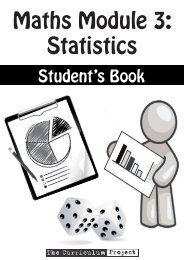Student's Book â Dec 2009 (5.9mb) - The Curriculum Project
Student's Book â Dec 2009 (5.9mb) - The Curriculum Project
Student's Book â Dec 2009 (5.9mb) - The Curriculum Project
Create successful ePaper yourself
Turn your PDF publications into a flip-book with our unique Google optimized e-Paper software.
KEY WORDSalleviate (v) – to lighten or lessen pain and sufferinganti-retroviral (adj) – medication for the treatment of viruses like HIVcriticise (v) – to comment on the faults of someone or somethingexport demand (n) – the amount that other countries want to buy goods from your country.handout (n) – something that is given for freeHIV (n) – a virus in that attacks the immune systeminterest (n) – the fee that you pay when you borrow moneylandslide (adj) – used to describe winning by a large number of votesmicro-credit (n) – a small financial loan given to people living in poverty so that they canbecome self-employed and make an income in order to exit povertyrevival (n) – bringing new attention to an old activity or thingsubsidised (adj) – having financial support from the governmentModern ThailandPerhaps the most well known figure in Thai politics today is Thaksin Shinawatra. Thaksin firstentered Thai politics in 1994. Four years later, he founded his own political party, the populistThai Rak Thai (TRT) party. Thaksin’s party won in a landslide election in 2001, making him thePrime Minister of Thailand. He became the first prime minister in the history of the country toserve a full term.Thaksin is most known for his attempts to alleviate rural poverty through his universal healthcare scheme. He is also known for his economic policies and for his war on drugs.Universal health care: Thaksin changed two key parts of the Thai medical system. First, hesubsidised universal health care and second, he ensured low-cost universal access to antiretroviralHIV medication (ARVs). Thaksin’s 30 baht per visit universal health care programwas popular with the general public, but was criticised by many doctors and officials. <strong>The</strong>program allowed many people to access health care who could not afford to do so before.However, because so many more people were using the health care system, it made more workfor doctors. As a result, some doctors left public hospitals for better paid jobs in private hospitals.Some people say the program is a good idea, but is not adequately funded.Economic policies: Thaksin’s government started many new programs to promote developmentin poor rural areas. Some of these programs included village-managed micro-creditdevelopment funds, low-interest agricultural loans, and direct inputs of cash into villagedevelopment funds. Other economic programs involved infrastructure development, and the OneTambon One Product (OTOP) rural small and medium enterprise development program.Thaksin’s economic policies for the whole country helped accelerate Thailand’s economicrecovery from the 1997 Asian Financial Crisis and significantly reduced poverty. GDP grewfrom 4.9 trillion Baht at the end of 2001 to 7.1 trillion Baht at the end of 2006. Thailand repaidits debts to the International Monetary Fund two years ahead of schedule. Between 2000 and2004, income in the poorest part of the country, the Northeast, rose 40 per cent while nationwidepoverty fell from 21.3 per cent to 11.3 per cent. <strong>The</strong> Stock Exchange of Thailand outperformedother markets in the region.Economists from the Thailand Development Research Institute argue that other factors, such as arevival in export demand, were the primary cause behind the economy’s recovery. Others claimthat the policies got the rural poor too dependent on the government’s handouts.71



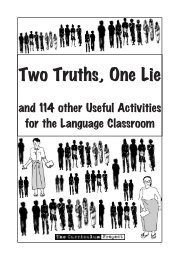
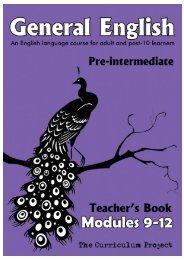
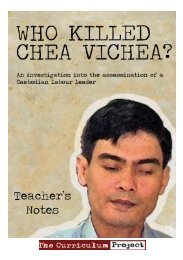
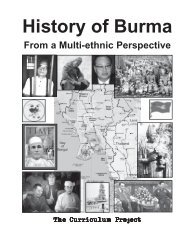

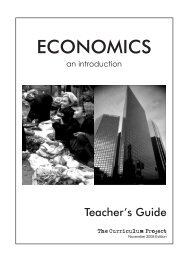
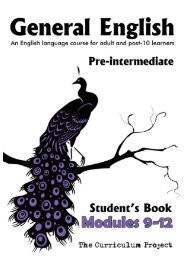



![[Eng] Nov 2012 DRAFT - The Curriculum Project](https://img.yumpu.com/45590859/1/184x260/eng-nov-2012-draft-the-curriculum-project.jpg?quality=85)


